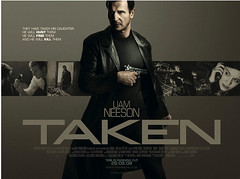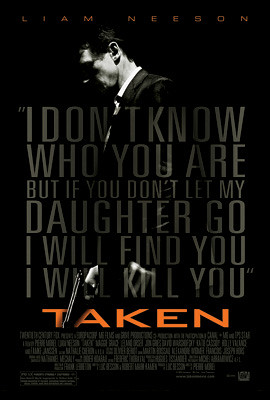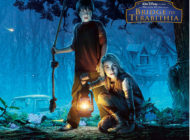TAKEN pt. 1: A Father’s Redemption
“Children’s children are a crown to the aged, and the parents are the pride of their children.” – Proverbs
(For the introduction to our series on Taken, click here)
Pierre Morel’s Taken focuses on a familiar scenario in our generation: absentee Dad. Statistics suggest 40% of kids in the United States go to bed with no Dad in the home. It’s the absent father figure that has spun into several redemptive narratives, surfacing story trends that deal with the reconciliation of our Daddy issues.
Bryan Mills (Liam Neeson) let work consume his life, his job as CIA “preventer” estranging him from wife and daughter. Having failed on the family front, he’s eager to prove himself – so eager, in fact, that he actually accommodates his daughter when he shouldn’t. Kim desires something rash and inadvisable, and even though he seeks to make his agreement conditional, Bryan tries to be “friend” instead of father and allows her to go to Paris, even when she has clearly been deceitful with the plan.
It’s a common error for Dad to try to win a child’s affection as “buddy” instead of a dad. Father’s are designed to lead their home, shepherd and protect their children – especially from their own childish folly. Providentially, however, the same skills Bryan developed in building the career that alienated him from his family become redemptive gifts when his daughter is put in danger. He is able to channel his skills in a fatherly direction toward the relentless pursuit of his child.
In Bryan’s eyes, the eyes of his daughter, and perhaps the eyes of the viewer, he is given the opportunity to redeem a fractured family bond; although the chance is afforded by nightmarish circumstance, it works out for good beyond the mere saving of a life and transcends to healing a longer life arc between he and his family.
When the apostle Paul wrote 2,000 years ago that “if anyone does not provide for his relatives, and especially for members of his household, he has denied the faith…” he was not just speaking of financial provision, but alluding to  what kind of legacy we are building. How are fathers providing not just for the stomachs of their family and the roof over their heads, but also the way they model their role, leading the hearts and minds of those they are called to care for? Bryan Mills looks at the years passing by with singular pictures of his little girl becoming a woman, and likely wonders… what man will she marry based on the example and expectation he has modeled for her? What will his daughter’s future children see when they look at granddad? Something must change…
what kind of legacy we are building. How are fathers providing not just for the stomachs of their family and the roof over their heads, but also the way they model their role, leading the hearts and minds of those they are called to care for? Bryan Mills looks at the years passing by with singular pictures of his little girl becoming a woman, and likely wonders… what man will she marry based on the example and expectation he has modeled for her? What will his daughter’s future children see when they look at granddad? Something must change…
The quiet moments in this film – albeit brief – speak volumes. There is Hollywood wish fulfillment here, a confluence of events that redeems daddy and brings a strong parental figure into view in a culture where it is increasingly absent. The great post-film discussion is what this might really look like, apart from a hideous happenstance involving human trafficking and a father trained by the CIA. How do we really redeem the role of father in our broken culture?
By the end of the film, a different picture has been taken, and hopefully daughter Kim has learned some life lessons as well, which we’ll discuss in Taken part 2: Her Father’s Regulation.





Taken was a fantastic film. Truly enjoyable, and although a familiar plot line, it was flawlessly executed with a stripped-back rawness often hard to find in action films these days. Liam Neeson nailed this role. As men (married, fathers, and single), we could learn a thing or two from Bryan Mill’s relentless pursuit of his daughter at any cost to himself. Although it probably wasn’t the writer/director’s intention, we see a great human (and no doubt somewhat flawed) portrayal of how Christ pursued and continues to pursue us, his sons and daughters, at any cost.
Reading these reviews, I feel like I watched a completely diferent film to everyone else! I caught this for the first time the other day, and I can’t say that I was Taken.
Liam Neeson’s character seemed cold and ruthless. I didn’t get the impression of a loving father as much as a vindictive killing machine who is let off the leash and lent a legitimacy for his sadism by the fact that it is his daughter who has been kidnapped. He shows not the least bit of compassion for anyone he encounters while on his killing spree, except for a fleeting moment of grief when he finds the daughter’s friend, and this seems to be brought on more by the thought that his daughter could have been in her place. I’m not saying that the man doesn’t love his daughter but, seriously, the man is a thug.
I did also have an issue with the idea that if you let your daughter travel abroad, bad things will happen. I live in Europe and have never yet been trafficked for sex. I know that bad things do happen to vulnerable people abroad, but this film suggests that they are bound to occur.
I’m sorry about the rant! There’s just a lot about this film that bugs me!
Thanks for weighing in, Anna! I know how a place or culture can get a stigma from a particular kind of film. I live in Seattle where we are apparently “Sleepless”, but actually sex trafficking is real here and bigger than many realize. It’s not a “Europe” thing. Also, many American city-dwellers think if you go into the midwest or woods around here you’ll be hacked to death by mentally-damaged hicks or some guy with a mask. One film plot should not a stereotype make!
I’m curious who Mills ran across who you thought warranted compassion, other than the daughter’s friend and the other gal who had the coat. I was very disappointed in his corrupt “old friend” but most certainly his wife didn’t deserve torture. There’s no question in nuance that Mills is a very flawed man, and that’s the difference between talking about overarching themes the narrative is striving for versus how perfectly it achieved them. He is definitely an imperfect man struggling to make up for mistakes in his past, not modeling perfection. When we say aspects of the storyline make him mirror God as father, it is only to suggest in the same way a clown mirror at the fair perfectly images me:)
Additionally, I think the film is struggling to regain a sense of Dad as protector, instead of the overly-indulging, weak-willed, responsibility-abdicating dad SO many people of our generation have grown up with. We have fathers who were more worried about their own self-image that they didn’t raise their kids properly, more desperate for their child’s approval than actually teaching them discipline and responsibility and how to live. We have so many dad’s who want to be their child’s “buddy” that they forsake all sense of actually leading.
That’s not to say there aren’t still plenty of overly harsh, moralistic and restrictive parents out there, and they can make life just as hard. However, I think for many who grew up with ABSENT Dad, who never experienced hugs OR fierce protection, the idea of an enigmatic figure who swoops in and crushes all of their fears and opposition is an obvious yearning.
As for the thuggish aspects, we are in a culture that has trouble reconciling the idea of “invincible overseer” with “warmth and compassion”. Ever wonder why we struggle culturally to tell a good Superman story but have such a love for Batman? The latter is far more of a thug, and yet culturally we seem to find him more appealing. Even the 21st century James Bond is more determined and resolute, less smiley and charming. Perhaps this says something else about us presently…
I see where you’re coming from with the idea of God as protector, able to reach into the far corner of the globe, but the impression that I got from this film that it was aimed more at parents than at their children. It seems to tap into that culture of fear that we have in society today, the one that media exploits to tell us that we need to keep a gun at hom to protect us from the paedophiles round the corner and the murderer at our door. In a way, it seems to demonstrate the kind of reaction we are to have as protective parents in the ABSENCE of a powerful God. It’s a way of counteracting our own feeling of helplessness. If our child went missing, we’d want to tear apart the world in order to get them back, wherea in reality we are left wringing our hands and waiting for updates from the police. In a world in which there is no God atching over us, Taken is an exmple of our need to feel as though we can take things into our own hands.
As a slight aside, the other modern idea that it buys into is that it is admirable to consider your child above all others. Mills demonstrates this when he breaks into the brothel, encounters girl after girl chained to radiators, but doesn’t spare them a second glance. We never learn their fate. It seems culturally acceptable to consider our child precious above all others, to the extent that we can trample over others in order to achieve the best for them. It’s a kind of extended selfishness tht we legitimise by saying that it’s for our child. This isn’t explicitly stated in the film, but even the treatment of the daughter buys into that idea. No crack den for Mills’ daughter – she is only fit to be the property of a rich oil baron!
The bit where I found he showed the least compassion and the most thuggishness was when Mills electrocuted that guy in the basement. I thought that was unneccessary torture and was brought about more by his sadistic tendencies than his care for his daughter. I’m not particularly averse to violence in movies, but I didn’t like the way it is portrayed in this movie as morally praiseworthy.
The portrayal of fathers in film as both loving and protective is an interesting one. The best films I’ve seen recently that tread this line are actually Pixar ones – The Incredibles and Finding Nemo both portray fathers who are dealing with their own flaws bu who overcome great odds in order to protect their families.
I see where you’re coming from with the idea of God as protector, able to reach into the far corner of the globe, but the impression that I got from this film that it was aimed more at parents than at their children. It seems to tap into that culture of fear that we have in society today, the one that media exploits to tell us that we need to keep a gun at hom to protect us from the paedophiles round the corner and the murderer at our door. In a way, it seems to demonstrate the kind of reaction we are to have as protective parents in the ABSENCE of a powerful God. It’s a way of counteracting our own feeling of helplessness. If our child went missing, we’d want to tear apart the world in order to get them back, wherea in reality we are left wringing our hands and waiting for updates from the police. In a world in which there is no God atching over us, Taken is an exmple of our need to feel as though we can take things into our own hands.
As a slight aside, the other modern idea that it buys into is that it is admirable to consider your child above all others. Mills demonstrates this when he breaks into the brothel, encounters girl after girl chained to radiators, but doesn’t spare them a second glance. We never learn their fate. It seems culturally acceptable to consider our child precious above all others, to the extent that we can trample over others in order to achieve the best for them. It’s a kind of extended selfishness tht we legitimise by saying that it’s for our child. This isn’t explicitly stated in the film, but even the treatment of the daughter buys into that idea. No crack den for Mills’ daughter – she is only fit to be the property of a rich oil baron!
The bit where I found he showed the least compassion and the most thuggishness was when Mills electrocuted that guy in the basement. I thought that was unneccessary torture and was brought about more by his sadistic tendencies than his care for his daughter. I’m not particularly averse to violence in movies, but I didn’t like the way it is portrayed in this movie as morally praiseworthy.
The portrayal of fathers in film as both loving and protective is an interesting one. The best films I’ve seen recently that tread this line are actually Pixar ones – The Incredibles and Finding Nemo both portray fathers who are dealing with their own flaws bu who overcome great odds in order to protect their families.
Great point about the Pixar films, they do just that! I’m actually very curious to see if “Taken 2” touches on the points you’re making, Anna. It’s my understanding those after Mills and his family in the second film are people attached or related to the people he killed in the first film, which could shed some light on his faults and expose some of his own hypocrisy in the first chapter. Not sure that they’ll deal with it like that, but it could be interesting if they went that deep with it.
I think you’re totally right Anna – one can import themself into the role of Mills as a form of narrative therapy for the helplessness they feel. My hope is that people can realize a “perfect” form of Mills is not something we can be, but someone transcendent. Our fears can only be allayed if we realize it is not us and ultimately not an “earthly” father, but that fuzzy yearning inside us for something akin to this is only satisfied by someone much higher.